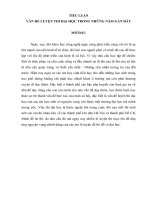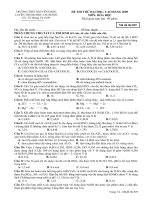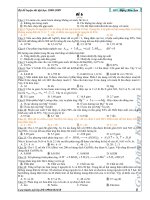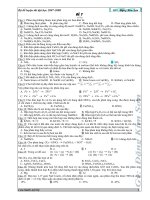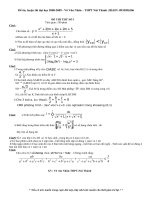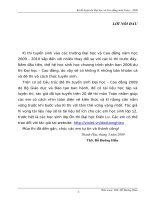Luyen Thi Dai Hoc 2009 Test 16
Bạn đang xem bản rút gọn của tài liệu. Xem và tải ngay bản đầy đủ của tài liệu tại đây (134.75 KB, 5 trang )
<span class='text_page_counter'>(1)</span><div class='page_container' data-page=1>
<b>LUYỆN THI TUYỂN SINH ĐẠI HỌC 2009 </b>
<b>PRACTICE TEST 16 – 08 – 7 - 2009 </b>
<i><b>Questions 1-5. Mark the letter A, B, C, or D to indicate the word that differs from the rest in the position of </b></i>
<i><b>the main stress in each of the following questions. </b></i>
1. A. decision B. deceive C. decisive D. decimal
2. A. malice B. police C. office D. practice
3. A. economy B. envelope C. attitude D. regular
4. A. delicious B. convincing C. theory D. emphatic
5. A. appetite B. appreciate C. architect D. arable
<i><b>Questions 6 - 35. Mark the letter A, B, C, or D to indicate the correct answer to each of the following </b></i>
<i><b>questions. </b></i>
6. If she..., she will get a surprise.
A. comes B. came C. has come D. will come
7. Petrol in this country is so expensive...we use public transport as much as possible.
A. then B. that C. thus D. than
8. A patient is someone …..
A. who waits a long time B. who is very patient
C. under a doctor's care D. about to leave the house
9. In my mother's..., it is essential to eat a big breakfast.
A. principle B. idea C. confidence D. opinion
10. Oil...in many parts of the Persian Gulf.
A. has found B. finds C. is found D. is finding
11. A...is an actor who always has funny parts in plays.
A. comedian B. guardian C. musician D. magician
12. I'd...do my lessons than play in the streets.
A. prefer B. eager C. rather D. better
13. He was born in Scotland but he... in Northern Ireland.
A. raised B. grew up C. brought up D. rose
14. Graham works well in class, but his ... could be better.
A. rudeness B. behaviour C. politeness D. acting
15. It was... a difficult question that we couldn't answer it.
A. so B. such C. very D. too
16. You can't speak Russian. ~ ... .
A. Either can I B. Neither can't I C. Neither can I D. I can't neither
17. They...all day swimming and sunbathing at the beach.
A. passed B. used C. spent D. occupied
18. How long will it …..you to get there?
A. take B. need C. have D. go
19. Mr. Brown invented the machine...
A. hisself B. itself C. himself D. his own
20. When it began to rain, they...in the yard.
A. played B. have played C. had played D. were playing
21. That was a very... story about the adventure in the tropical forests.
A. excitement B. excited C. exciting D. excitingly
22. I was in such a hurry that I left one of my bags...
A. out B. aside C. on D. behind
23. If your camera is faulty, you should return it to the...
A. creator B. builder C. inventor D. manufacturer
24. She is always complaining about....the children from school.
A. to meet B. meeting C. collecting D. education
25. Julian Snow has been a war …..for many years and covered number of conflicts.
A. correspondent B. news-agent C. editor D. publisher
26. Nothing has changed in this town since I first...it.
</div>
<span class='text_page_counter'>(2)</span><div class='page_container' data-page=2>
27. We...by a loud noise during the night.
A. woke up B. are woken up C. were woken up D. were waking up
28. Harry says he doesn't remember (meet) Sally before…….
A. meeting B. to meet C. to have met D. to have been meeting
29. The ship was...around the Mediterranean Sea.
A. running B. sinking C. sailing D. flying
30. By the age of twenty-five he had ... his ambition of becoming a pianist.
A. achieved B. completed C. reached D. obtained
31. His roses won first...in the local flower competition.
A. cup B. price C. prize D. reward
32. I wish our teacher...our problems a little.
A. understands B. understood C. has understood D. will understand
33. He's very poor, and he has ... possessions,
A. any B. little C. a little D. few
34. There are now six billion people living on... .
A. earth B. world C. globe D. universe
35. Do you...to use a computer?
A. know B. able C. understand D. know how
<i><b>Questions 36 - 45. Read the following passage and mark the letter A, B, C, or D to indicate the best option </b></i>
<i><b>for each of the blanks. </b></i>
<b>THE IMPORTANCE OF PLANTS </b>
Man has always depended on plants (36) ... food and many other useful products. For this reason, farming is
one of the world's most important industries. At first, (37)...man did not know how to plant seeds and raise
crops. He (38)...wild fruits and vegetables where he found them. Then man discovered how to grow his own
food. He (39)... seeds and waited for the crop to grow. For the first time, he could be reasonably sure of his
food supply. He could settle down and (40)... shelters in the places where he grew food.
As populations began to increase, the (41)... for food became greater. Old-fashioned tools and farming
methods were insufficient in meeting the demand, so man cultivated more and more land and invented
complicated machines to make his work easier. Tractors replaced horses
and other farm animals. Scientists studied and (42)... with plants.
They, told farmers how to (43)... plant diseases, and how to grow bigger and better crops. Now one man,
with a knowledge of plants and the (54) ... of machines, can cultivate hundreds of acres.
He can raise plants which did not originally grow in the soil or (45) ...of his community.
36. A. about B. with C. for D. to
37. A. early B. initial C. primary D. original
38. A. collected B. gathered C. assembled D. amassed
39. A. brought up B. raised C. grew D. planted
40. A. form B. set up C. build D. construct
41.A. demand B. request C. requirement D. necessity
42. A. practised B. tried on C. tested D. experimented
43. A. check B. control C. wipe out D. dismiss
44. A. aid B. support C. assistance D. help
45. A. situation B. condition C. climate D. weather
<i><b>Questions 46 - 50. Read the following passage and mark the letter A, B, C, or D to indicate the best answer </b></i>
<i><b>to each of the following questions. </b></i>
The government published a report yesterday saying that we need to eat more healthily — more fruit and
vegetables, less fat and sugar. So that means fewer burgers, chips and fried food as well as cutting down on
sweet things. We- went into central London yesterday at lunch-time and asked people what they thought about
it.
</div>
<span class='text_page_counter'>(3)</span><div class='page_container' data-page=3>
Tim Kennor, a librarian, welcomes the government advice. But he also has his own rules. 'I think,' he explains,
eating his fried chicken and chips, 'it's important to eat a variety of food.' We then asked Dorothy Matthews,
aged 74. 'I don't think it's the government's business to tell us what to eat.'
We went into Simpson's restaurant and asked the manager if people had changed what they were eating. 'I
don't-think people believe all these reports any more. What they say is good for you in June, they say is bad for
you in July. People -have stopped taking notice. We serve what we've always served. Almost all of it is
fattening.
46. What is the writer trying to explain in the text?
A. what people think B. his own opinion
C. the government report D. the popularity of certain foods
47. What can the reader learn from the text?
A. what the government is going to do B. which meals are healthiest
C. what kind of people like beefburgers D. whether the advice will be followed
48. What is Paul Keel's opinion?
A. The government's advice is wrong. B. Fish isn't good for you.
C. He doesn't need to change his habits. D. He eats too many beefburgers
49. What does the manager think of the report?
A. People don't understand the advice given.
B. People think they will soon be given different advice.
C. People don't bother to read these reports.
D. People are more concerned about losing weight.
50. Which of the following is part of the government report ?
A. The population of this country should eat less.
B. Bad health in this country is caused by people eating the wrong kinds of food. .
C. People should take the time to prepare their own food at home instead of eating in restaurants.
D. working people should make sure they have a good hot meal in the middle of the day.
<i><b>Questions 51 - 60. Read the following passage and mark the letter A, B, C, or D to indicate the best answer </b></i>
<i><b>to each of the following questions. </b></i>
Western people rely on technical and mechanical solutions in everything they do. Refrigerators preserve their
food, washing machines clean their underwear and computers are supposed to solve all their problems. When
they are ill, they rely on the surgeon's knife. If their hearts are running down, then they must be repaired; if
they cannot be repaired, they should be replaced, just as an old car sometimes gets a new engine. But up to now
we had a shortage of donors to give their hearts: to keep one person alive, another donor had to die.
Nowadays there is more and more talk about using monkeys. Every monkey has a near-human heart, and
humans have always been over careful in respecting the lives and well-being as other animals. This includes
the life and well-being of other humans. Therefore in the early years of the 21st century - I was told - the mass
killings of monkeys may occur. We'll need to use their hearts for human consumption.
Monkeys, on the whole, are happier creatures than their near relatives, Homo Sapiens, or man. They know
fear, of course, and they face real dangers, but they are also more intelligent than us. They create no
unnecessary dangers for themselves; they run no businesses, chase no money, are unimpressed by gold - that
utterly useless metal, and they do not care at all about hell or evil spirits. I have a vague feeling that it is not
monkeys' hearts that we ought to implant in ourselves but monkeys' brains.
51. According to the author, westerners believe health problems can be solved by …
A. spending more money on scientific research.
B. taking more precautions.
C. using technical or mechanical methods.
D. increasing the number of doctors.
52. The problem with heart transplants has been that …
A. artificial hearts do not work very well.
B. there are not usually enough donors.
C. some of the heart donors are too old.
D. many people die after the operations.
53. The author suggests that in the future …
A. people will care less about other human beings.
B. monkey hearts will form part of our diet.
C. monkeys will become extinct.
</div>
<span class='text_page_counter'>(4)</span><div class='page_container' data-page=4>
54. The author says that monkeys …
A. live in a relatively safe world in the jungle.
B. are not capable of feeling emotions like fear.
C. are not capable of logical thinking.
D. are usually more content than humans.
55. The author suggests that …
A. human being will return to more nature lifestyle.
B. we are wrong to think of ourselves as cleverer than monkeys.
C. monkeys would be better at running the world than humans.
D. scientists should work out how to do brain transplants.
56. The main point the author is making is that humans …
A. make life more complicated than it needs to be.
B. have no right to make use of other animals.
C. should worry less about growing old.
D. are similar in many ways to monkeys.
57. What does <b>donors</b><i> in line 5 mean? </i>
<i> A. doctors’ hearts </i> B. surgeons’ hearts C. monkeys’ hearts D. those who give their hearts
58. What does <b>this</b> in line 12 refer to?
A. using a monkey’s heart B. the talk about using monkeys
C. human respect for animals’ lives D. the heart donor
59. “They <b>run</b> no businesses.” “<b>run</b><i>” has the same meaning as… </i>
A. are in control of B. operate C. make a tour of D. travel
60. Which of the following was NOT mentioned in the passage?
A. Monkeys are more intelligent than humans.
B. Humans are less happy than monkeys.
C. Monkeys’ hearts consume more blood than humans’.
D. Monkeys’ brains should be implanted in humans’ bodies.
<i><b>Questions 61 - 70. Mark the letter A, B, C, or D to show the underlined part that needs correction. </b></i>
61. Writing the letter, she mailed it on her way to work.
A B C D
62. Our neighbours complained about us playing the stereo too loudly.
A B C D
63. As soon as we met, he began to excitedly chatter about the event.
A B C D
64. I am looking forward to see you again soon.
A B C D
65. She could not help noticing the man to cry like a child.
A B C D
66. One should avoid to eat a heavy meal late in the evening.
A B C D
67. If I will get the money in time, I will go to California on my next vacation.
A B C D
68. Applying at the University of Arizona, she anxiously awaited her acceptance.
A B C D
69. We saved money this year for to take a trip to Hong Kong.
A B C D
70. What do you think of us having a party to celebrate?
A B C D
<i><b>Questions 71 - 75. Mark the letter A, B, C, or D to indicate the sentence that has the same meaning as the </b></i>
<i><b>original one. </b></i>
71. Alternative medicine is a complete mystery to some people.
A. Some people are completely mysterious by alternative medicine.
B. Alternative medicine is completely mysterious for some people.
C. Some people are completely mysterious for alternative medicine.
D. Some people are completely mystified by alternative medicine.
72. We will not see each other again before I go.
</div>
<span class='text_page_counter'>(5)</span><div class='page_container' data-page=5>
B. This will be the last time we see each other before I go.
C. This will be the final time we see each other before you go.
D. It will be the ending time we see each other before I go.
73. She did not shed a tear when the story ended in tragedy.
A. Not a tear she shedded when the tragic story ended.
B. Not a tear did she shed when the tragedy in the story ended.
C. Not a tear did she shed when the tragic story ended.
D. Not a tear did she shed when the story ended in tragedy.
74. Both of the lifts are out of order.
A. Neither of the lifts were working.
B. None of the lifts was working.
C. Neither of the lifts was working.
D. Not one of the lifts was working.
75. Whatever the methods used to obtain the result, drugs were definitely not involved.
A. It was out of question of drugs being involved, whatever used the methods to obtain the results.
B. There was no questions of drugs being involved, whatever the methods used to obtain the results.
C. There was no questions of drugs involved, whatever results the methods used to obtain.
D. Drugs was not involved, no matter what methods used to obtain the results.
<i><b>Questions 75 - 80. Mark the letter A, B, C, or D to indicate the best sentence made from the given words. </b></i>
76. a new school / be / built / area / where / recently / there / used / lots of / garbage
A. A new school has been recently built in the area where there used to be lots of garbage.
B. A new school was recently built in the area where there is lots of garbage used.
C. A new school is being built in the area where there is lots of garbage used recently.
D. A new school will be recently built in the area where there used to be lots of garbage.
77. she / be / woman / telephone / police / that?
A. Was she the woman that was telephoned the police?
B. Was she the woman that telephoned the police?
C. Was the woman that she telephoned the police?
D. Was the police the woman telephoned that?
78. he / stop / work / the project / although / not / finish / it / yet
<b> </b>A. He stopped to work on the new project although he has not finished it yet.
B. He stopped working on the new project although he had not finished it yet.
C. He stopped working on the new project although he has not finished it yet.
D. He stopped working the new project although he had not finished it yet.
79. she / often / lie / awake / night / because / have / much / pressure / work
A. She often lies awake at night because she has too much pressure to work.
B. She is often lying awake by night because she has to work with much pressure.
C. She often lies awake at night because she has so much pressure at work.
D. She often lies awake at night because she has worked on so much pressure.
80. how / about / come / my flat / have / something / eat / before / go?
A. How about coming over to my flat to have eaten something before we go?
B. How about coming over to my flat and to have eaten something before going?
C. How about coming over to my flat and have to eat something before we go?
D. How about coming over to my flat and have something to eat before we go?
<b>ANSWER KEY TO TEST 16 </b>
1
D
9
D
17
C
25
A
33
D
41
D
49
C
57
D
65
C
73
D
2
B
10
C
18
A
26
B
34
A
42
B
50
B
58
C
66
B
74
C
3
A
11
A
19
D
27
C
35
C
43
D
51
C
59
A
67
A
75
B
4
C
12
C
20
D
28
A
36
A
44
C
52
B
60
C
68
A
76
A
5
B
13
B
21
C
29
C
37
B
45
A
53
D
61
A
69
C
77
B
6
A
14
B
22
D
30
A
38
D
46
A
54
D
62
B
70
B
78
B
7
B
15
B
23
D
31
C
39
C
47
D
55
B
63
B
71
D
79
C
</div>
<!--links-->
